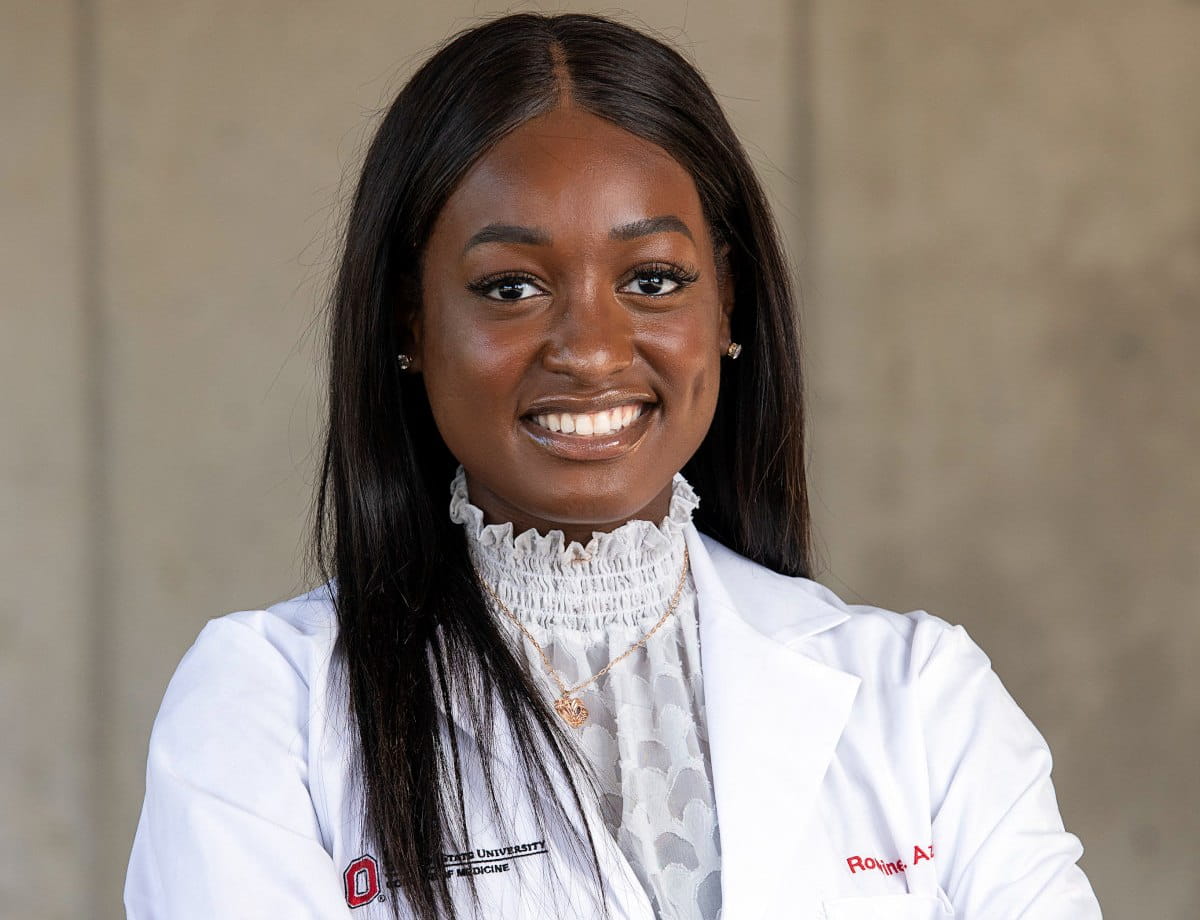
Rosevine Azap is a third-year medical student and the president of The Ohio State University College of Medicine Student Council. Her education and advocacy center on addressing health inequities in clinical practice and the health care system. Her most recent efforts have redefined a key component of a kidney function test used at many health care systems around the country, including at The Ohio State University Wexner Medical Center.
Early in her training, Azap noticed that the algorithm used to determine a patient’s kidney function included a variable for race. This clinical algorithm is called the estimated Glomerular Filtration Rate, or eGFR. A low eGFR indicates poor kidney function and can prompt essential medical interventions.
She identified another health care discrepancy concerning race — that there were inequities that prompted patients to readily undergo kidney transplants.
Azap couldn’t help but wonder whether the race-based eGFR created differences in care, influencing a minoritized patient’s treatment options or consideration for a kidney transplant.

“When I noticed that the clinical algorithm for kidney function still incorporated race and recent studies had proposed a new formula without race, I knew that I had to do something,” Azap says. “I had to advocate for systemic change.”
Studies indicate that this old algorithm can disadvantage Black patients by potentially delaying referral to specialty care or consideration for a kidney transplant. So in September of 2021, Azap presented these critical findings to the College of Medicine’s Equity and Anti-Racism Task Force and called for change.
“In my role as president of Student Council, I felt that it was imperative that I inform our College of Medicine leadership about the inequities that are perpetuated by our medical center’s use of the race-based eGFR,” Azap says.
Azap proposed a change in the way that clinical laboratories and health care professionals calculate eGFR, suggesting the implementation of the newly developed, race-independent formula. University leaders and hospital administration agreed and were instrumental in implementing the new equation. By Feb. 1, 2022, the race-independent eGFR formula was in full force.
Azap’s continuous efforts to combat health disparities highlights the integral role medical students at Ohio State play in identifying clinical issues, advocating for change and combating systemic racism. She says she’s witnessed how instrumental students can be in advocating for change.
“Ohio State equips and empowers its students to be agents of innovation and change in medicine,” Azap says. “I truly believe that this allows us to create an immense impact on patients and health care.”
Leon McDougle, MD, MPH, associate dean for Diversity and Inclusion and the chief diversity officer at the Ohio State Wexner Medical Center, believes that the collaboration of student leaders, such as Azap, with university and hospital administration is representative of a new shift in medicine: the advocacy for health equity in health care institutions, throughout the field of medicine and within communities.
“We know and understand that inequities exist in access to care,” Dr. McDougle says. “However, those inequities don’t stop once patients are within the confines of a hospital. That’s why we all have to actively work to identify and combat all forms of racism in health care.”
Dr. McDougle states that Ohio State’s anti-racism initiatives aim to equip medical students with the tools necessary to recognize and address the devastating impacts of health inequities, preparing them for the future of health care.
Azap is part of a new generation of medical students committed to addressing health care disparities on all levels. She believes there are a multitude of promising changes taking place in the field of medicine and at Ohio State — one being the focus on diversity.
“Though there is still a lot of work to do in the field of medicine, physicians are the most diverse they’ve ever been,” Azap says. “This diversity of experience, thought and representation gives hope to what can be accomplished.”
The College of Medicine is committed to cultivating an environment that understands and represents the lived experiences of people across diverse backgrounds and promotes belonging. A fundamental part of this is the intentional recruitment of medical students and residents who’ve been historically excluded from medicine. Azap is hopeful as she continues her career, ready to implement equitable change in medicine and the health care setting.
“The future of health care is bright. One of its most promising changes is addressing health inequities through empowerment and representation,” Azap says.

The future of medicine is at Ohio State
Our innovative curriculum, life-altering biomedical research and unsurpassed patient care make us one of the top medical schools in the country.
Explore our programs



